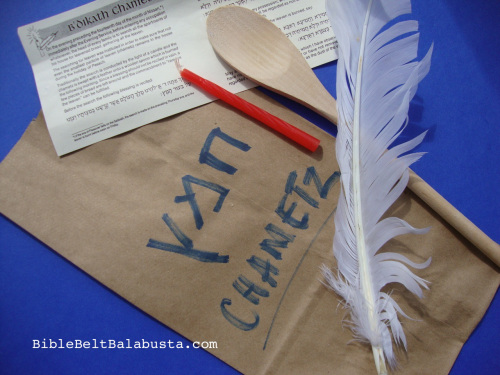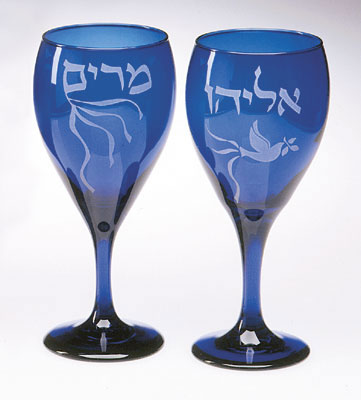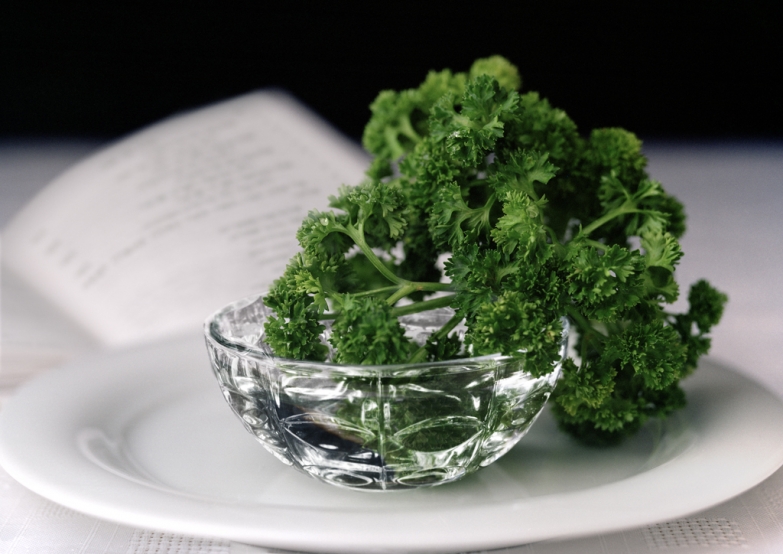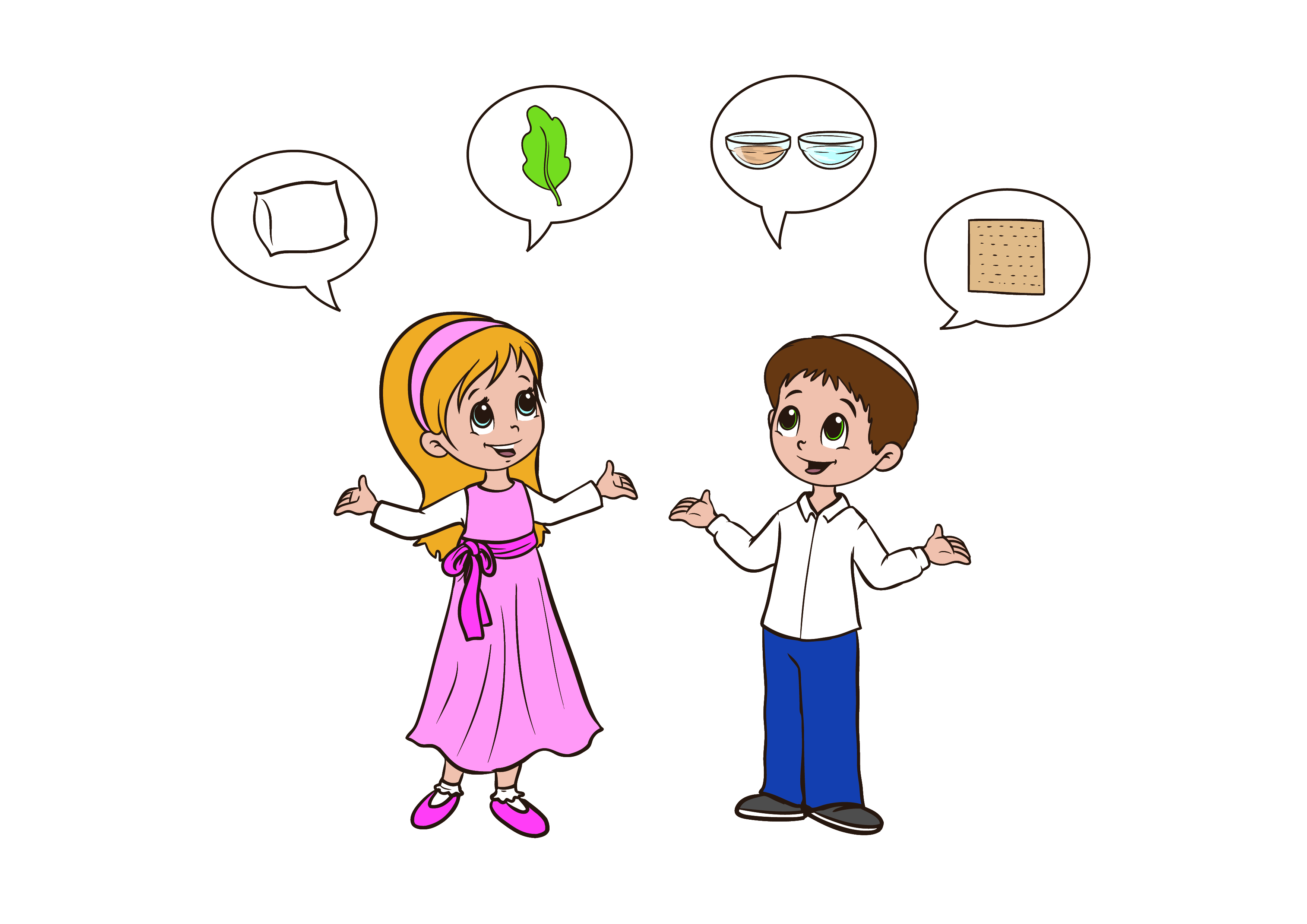This may take up to thirty seconds.
TABLE OF CONTENTS
One of the many fun customs associated with Passover is to search for, collect, and destroy any chametz (leavening or grain that ferments) in the house. Children are particularly enthusiastic about this “search and destroy” mission. Look any place in the house where chametz was used during the year. Or designate one family member to hide 10 pieces of chametz (a Kabbalistic tradition) throughout the house (just remember where you put them). Before the search this blessing is recited. Use the feather to sweep all the crumbs into the spoon and deposit them in the paper bag. The next morning, make one final search and then burn or discard the bag and its contents.
Baruch atah Adonai, Eloheinu Melech haolam, asher kid'shanu b'mitzvotav v'tzivanu al biur chametz.
Blessed are You, our God, Ruler of the world, who sanctifies us with mitzvot and calls upon us to remove chametz.
The seder officially begins with a physical act: lighting the candles. In Jewish tradition, lighting candles and saying a blessing over them marks a time of transition, from the day that is ending to the one that is beginning, from ordinary time to sacred time. Lighting the candles is an important part of our Passover celebration because their flickering light reminds us of the importance of keeping the fragile flame of freedom alive in the world.
Baruch Atah Adonai Eloheinu melech ha'olam asher kid'shanu b'mitzvotav, v'tzivanu l'hadlik ner shel Yom Tov.
Blessed are You, Adonai our God, Ruler of the Universe, who has sanctified us with laws and commanded us to light the festival lights.
As we light the festival candles, we acknowledge that as they brighten our Passover table, good thoughts, good words, and good deeds brighten our days.
The Seder Plate
We place a Seder Plate at our table as a reminder to discuss certain aspects of the Passover story. Each item has its own significance.
Maror – The bitter herb. This symbolizes the harshness of lives of the Jews in Egypt.
Charoset – A delicious mix of sweet wine, apples, cinnamon and nuts that resembles the mortar used as bricks of the many buildings the Jewish slaves built in Egypt
Karpas – A green vegetable, usually parsley, is a reminder of the green sprouting up all around us during spring and is used to dip into the saltwater
Zeroah – A roasted lamb or shank bone symbolizing the sacrifice made at the great temple on Passover (The Paschal Lamb)
Beitzah – The egg symbolizes a different holiday offering that was brought to the temple. Since eggs are the first item offered to a mourner after a funeral, some say it also evokes a sense of mourning for the destruction of the temple.
Orange - The orange on the seder plate has come to symbolize full inclusion in modern day Judaism: not only for women, but also for people with disabilities, intermarried couples, and the LGBT Community.
Matzah
Matzah is the unleavened bread we eat to remember that when the jews fled Egypt, they didn’t even have time to let the dough rise on their bread. We commemorate this by removing all bread and bread products from our home during Passover.
Elijah’s Cup
The fifth ceremonial cup of wine poured during the Seder. It is left untouched in honor of Elijah, who, according to tradition, will arrive one day as an unknown guest to herald the advent of the Messiah. During the Seder dinner, biblical verses are read while the door is briefly opened to welcome Elijah. In this way the Seder dinner not only commemorates the historical redemption from Egyptian bondage of the Jewish people but also calls to mind their future redemption when Elijah and the Messiah shall appear.
Miriam’s Cup
Another relatively new Passover tradition is that of Miriam’s cup. The cup is filled with water and placed next to Elijah’s cup. Miriam was the sister of Moses and a prophetess in her own right. After the exodus when the Israelites are wandering through the desert, just as Hashem gave them Manna to eat, legend says that a well of water followed Miriam and it was called ‘Miriam’s Well’. The tradition of Miriam’s cup is meant to honor Miriam’s role in the story of the Jewish people and the spirit of all women, who nurture their families just as Miriam helped sustain the Israelites.
All Jewish celebrations, from holidays to weddings, include wine as a symbol of our joy – not to mention a practical way to increase that joy. The seder starts with wine and then gives us three more opportunities to refill our cup and drink.
בָּרוּךְ אַתָּה יְיָ, אֱלֹהֵינוּ מֶלֶךְ הָעוֹלָם, בּוֹרֵא פְּרִי הַגָּפֶן
Baruch Atah Adonai, Eloheinu Melech ha-olam, borei p’ree hagafen.
We praise God, Ruler of Everything, who creates the fruit of the vine.
We praise God, Ruler of Everything, who chose us from all peoples and languages, and sanctified us with commandments, and lovingly gave to us special times for happiness, holidays and this time of celebrating the Holiday of Matzah, the time of liberation, reading our sacred stories, and remembering the Exodus from Egypt. For you chose us and sanctified us among all peoples. And you have given us joyful holidays. We praise God, who sanctifies the people of Israel and the holidays.
בָּרוּךְ אַתָּה יְיָ, אֱלֹהֵינוּ מֶלֶךְ הָעוֹלָם
שֶׁהֶחֱיָנוּ וְקִיְּמָנוּ וְהִגִּיעָנוּ לַזְּמַן הַזֶּה
Baruch Atah Adonai, Eloheinu Melech ha-olam,
she-hechiyanu v’key’manu v’higiyanu lazman hazeh.
We praise God, Ruler of Everything,
who has kept us alive, raised us up, and brought us to this happy moment.
Drink the first glass of wine!
Passover, like many of our holidays, combines the celebration of an event from our Jewish memory with a recognition of the cycles of nature. As we remember the liberation from Egypt, we also recognize the stirrings of spring and rebirth happening in the world around us. The symbols on our table bring together elements of both kinds of celebration.
We now take a vegetable, representing our joy at the dawning of spring after our long, cold winter. Most families use a green vegetable, such as parsley or celery, but some families from Eastern Europe have a tradition of using a boiled potato since greens were hard to come by at Passover time. Whatever symbol of spring and sustenance we’re using, we now dip it into salt water, a symbol of the tears our ancestors shed as slaves. Before we eat it, we recite a short blessing:
בָּרוּךְ אַתָּה יְיָ, אֱלֹהֵינוּ מֶלֶךְ הָעוֹלָם, בּוֹרֵא פְּרִי הָאֲדָמָה
Baruch Atah Adonai, Eloheinu Melech ha-olam, borei p’ree ha-adama.
We praise God, Ruler of Everything, who creates the fruits of the earth.
We look forward to spring and the reawakening of flowers and greenery. They haven’t been lost, just buried beneath the snow, getting ready for reappearance just when we most needed them.
-
We all have aspects of ourselves that sometimes get buried under the stresses of our busy lives. What has this winter taught us? What elements of our own lives do we hope to revive this spring?
At any other festival meal, we break bread and eat it. at the Seder, we break bread and hide it, reminding ourselves that the Seder is not only a celebration but also a search. The Seder is a search to understand the story of our ancestors, the meaning of our people's liberation, and the claims that our history makes on us.
To break the bread of affliction is to symbolically enact the breaking of shackles that have bound slaves throughout history, from our own ancestors in ancient Egypt to those still enslaved in other parts of the world today.
Each person take a matzo and as you break it in half think about what shackles mean to you and how you might work to break them in the coming year.
The formal telling of the story of Passover is framed as a discussion with lots of questions and answers. The tradition that the youngest person asks the questions reflects the centrality of involving everyone in the seder. The rabbis who created the set format for the seder gave us the Four Questions to help break the ice in case no one had their own questions. Asking questions is a core tradition in Jewish life. If everyone at your seder is around the same age, perhaps the person with the least seder experience can ask them – or everyone can sing them all together.
מַה נִּשְׁתַּנָּה הַלַּֽיְלָה הַזֶּה מִכָּל הַלֵּילות
Ma nishtana halaila hazeh mikol haleilot?
Why is this night different from all other nights?
שֶׁבְּכָל הַלֵּילוֹת אָֽנוּ אוֹכלין חָמֵץ וּמַצָּה הַלַּֽיְלָה הַזֶּה כֻּלּוֹ מצה
Shebichol haleilot anu ochlin chameitz u-matzah. Halaila hazeh kulo matzah.
On all other nights we eat both leavened bread and matzah.
Tonight we only eat matzah.
שֶׁבְּכָל הַלֵּילוֹת אָֽנוּ אוֹכְלִין שְׁאָר יְרָקוֹת הַלַּֽיְלָה הַזֶּה מָרוֹר
Shebichol haleilot anu ochlin shi’ar yirakot haleila hazeh maror.
On all other nights we eat all kinds of vegetables,
but tonight we eat bitter herbs.
שֶׁבְּכָל הַלֵּילוֹת אֵין אָֽנוּ מַטְבִּילִין אֲפִילוּ פַּֽעַם אחָת הַלַּֽיְלָה הַזֶּה שְׁתֵּי פְעמים
Shebichol haleilot ain anu matbilin afilu pa-am echat. Halaila hazeh shtei fi-amim.
On all other nights we aren’t expected to dip our vegetables one time.
Tonight we do it twice.
שֶׁבְּכָל הַלֵּילוֹת אָֽנוּ אוֹכְלִין בֵּין יוֹשְׁבִין וּבֵין מְסֻבִּין. :הַלַּֽיְלָה הַזֶּה כֻּלָּֽנוּ מְסֻבין
Shebichol haleilot anu ochlin bein yoshvin uvein m’subin. Halaila hazeh kulanu m’subin.
On all other nights we eat either sitting normally or reclining.
Tonight we recline.
As we tell the story, we think about it from all angles. Our tradition speaks of four different types of children who might react differently to the Passover seder. It is our job to make our story accessible to all the members of our community, so we think about how we might best reach each type of child:
What does the wise child say?
The wise child asks, What are the testimonies and laws which God commanded you?
You must teach this child the rules of observing the holiday of Passover.
What does the wicked child say?
The wicked child asks, What does this service mean to you?
To you and not to himself! Because he takes himself out of the community and misses the point, set this child’s teeth on edge and say to him: “It is because of what God did for me in taking me out of Egypt.” Me, not him. Had that child been there, he would have been left behind.
What does the simple child say?
The simple child asks, What is this?
To this child, answer plainly: “With a strong hand God took us out of Egypt, where we were slaves.”
What about the child who doesn’t know how to ask a question?
Help this child ask.
Start telling the story:
“It is because of what God did for me in taking me out of Egypt.”
-
Do you see yourself in any of these children? At times we all approach different situations like each of these children. How do we relate to each of them?
The first Passover happened long ago in the far-away country of Egypt. A mean and powerful king, called Pharaoh, ruled Egypt. Worried that the Jewish people would one day fight against him, Pharaoh decided that these people must become his slaves. As slaves, the Jewish people worked very hard. Every day, from morning until night, they hammered, dug, and carried heavy bricks. They built palaces and cities and worked without rest. The Jewish people hated being slaves. They cried and asked God for help. God chose a man named Moses to lead the Jewish people.
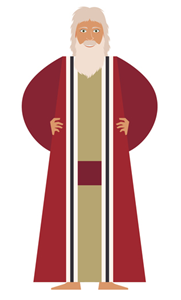
Moses went to Pharaoh and said, “God is not happy with the way you treat the Jewish people. He wants you to let the Jewish people leave Egypt and go into the desert, where they will be free.” But Pharaoh stamped his foot and shouted, “No, I will never let the Jewish people go!” Moses warned, “If you do not listen to God, many terrible things, called plagues, will come to your land.” But Pharaoh would not listen, and so the plagues arrived. First, the water turned to blood. Next, frogs and, later, wild animals ran in and out of homes. Balls of hail fell from the sky and bugs, called locusts, ate all of the Egyptians’ food.

Each time a new plague began, Pharaoh would cry, “Moses, I’ll let the Jewish people go. Just stop this horrible plague!” Yet no sooner would God take away the plague than Pharaoh would shout: “No, I’ve changed my mind. The Jews must stay!” So God sent more plagues. Finally, as the tenth plague arrived, Pharaoh ordered the Jews to leave Egypt.
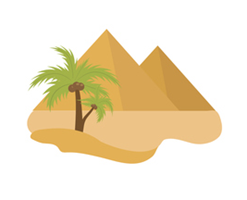
Fearful that Pharaoh might again change his mind, the Jewish people packed quickly. They had no time to prepare food and no time to allow their dough to rise into puffy bread. They had only enough time to make a flat, cracker-like bread called matzah. They hastily tied the matzah to their backs and ran from their homes.
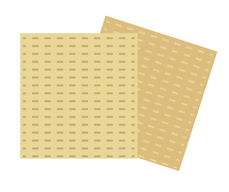
The people had not travelled far before Pharaoh commanded his army to chase after them and bring them back to Egypt. The Jews dashed forward, but stopped when they reached a large sea. The sea was too big to swim across. Frightened that Pharaoh’s men would soon reach them, the people prayed to God, and a miracle occurred. The sea opened up. Two walls of water stood in front of them and a dry, sandy path stretched between the walls. The Jews ran across. Just as they reached the other side, the walls of water fell and the path disappeared. The sea now separated the Jews from the land of Egypt. They were free!
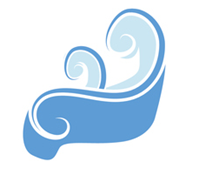
Each year at Passover, we eat special foods, sing songs, tell stories, and participate in a seder – a special meal designed to help us remember this miraculous journey from slavery to freedom.
As we rejoice at our deliverance from slavery, we acknowledge that our freedom was hard-earned. We regret that our freedom came at the cost of the Egyptians’ suffering, for we are all human beings made in the image of God. We pour out a drop of wine for each of the plagues as we recite them.
Dip a finger or a spoon into your wine glass for a drop for each plague.
These are the ten plagues which God brought down on the Egyptians:
Blood | dam | דָּם
Frogs | tzfardeiya | צְפַרְדֵּֽעַ
Lice | kinim | כִּנִּים
Beasts | arov | עָרוֹב
Cattle disease | dever | דֶּֽבֶר
Boils | sh’chin | שְׁחִין
Hail | barad | בָּרָד
Locusts | arbeh | אַרְבֶּה
Darkness | choshech | חֹֽשֶׁךְ
Death of the Firstborn | makat b’chorot | מַכַּת בְּכוֹרוֹת
The Egyptians needed ten plagues because after each one they were able to come up with excuses and explanations rather than change their behavior. Could we be making the same mistakes? Make up your own list. What are the plagues in your life? What are the plagues in our world today? What behaviors do we need to change to fix them?
The plagues and our subsequent redemption from Egypt are but one example of the care God has shown for us in our history. Had God but done any one of these kindnesses, it would have been enough – dayeinu.
אִלּוּ הוֹצִיאָֽנוּ מִמִּצְרַֽיִם, דַּיֵּנוּ
Ilu hotzi- hotzianu, Hotzianu mi-mitzrayim Hotzianu mi-mitzrayim, Dayeinu
If God had only taken us out of Egypt, that would have been enough!
אִלּוּ נָתַן לָֽנוּ אֶת־הַתּוֹרָה, דַּיֵּנוּ
Ilu natan natan lanu, natan lanu et ha-Torah, Natan lanu et ha-Torah , Dayeinu
If God had only given us the Torah, that would have been enough.
The complete lyrics to Dayeinu tell the entire story of the Exodus from Egypt as a series of miracles God performed for us. (See the Additional Readings if you want to read or sing them all.)
Dayeinu also reminds us that each of our lives is the cumulative result of many blessings, small and large.
As we now transition from the formal telling of the Passover story to the celebratory meal, we once again wash our hands to prepare ourselves. A good meal together with friends and family is itself a sacred act, so we prepare for it just as we prepared for our holiday ritual, recalling the way ancient priests once prepared for service in the Temple.
Anyone who wishes to is welcome to wash their hands.
בָּרוּךְ אַתָּה יְיָ אֱלֹהֵֽינוּ מֶֽלֶךְ הָעוֹלָם, אֲשֶׁר קִדְּשָֽׁנוּ בְּמִצְוֹתָיו, וְצִוָּנוּ עַל נְטִילַת יָדָֽיִם:
Baruch Atah Adonai, Eloheinu Melech ha-olam, asher kid’shanu b’mitzvotav v’tzivanu al n’tilat yadayim.
Blessed are you, spirit of the world, who made us holy through simple deeds like the washing of our hands.
The blessing over the meal and matzah | motzi matzah | מוֹצִיא מַצָּה
The familiar hamotzi blessing marks the formal start of the meal. Because we are using matzah instead of bread, we add a blessing celebrating this mitzvah.
בָּרוּךְ אַתָּה יְיָ, אֱלֹהֵֽינוּ מֶֽלֶךְ הָעוֹלָם, הַמּוֹצִיא לֶֽחֶם מִן הָאָֽרֶץ
Baruch Atah Adonai, Eloheinu Melech ha-olam, hamotzi lechem min ha-aretz.
We praise God, Ruler of Everything, who brings bread from the land.
בָּרוּךְ אַתָּה יְיָ, אֱלֹהֵֽינוּ מֶֽלֶךְ הָעוֹלָם, אֲשֶׁר קִדְּשָֽׁנוּ בְּמִצְוֹתַָיו וְצִוָּֽנוּ עַל אֲכִילַת מַצָּה
Baruch Atah Adonai, Eloheinu Melech ha-olam, asher kid’shanu b’mitzvotav v’tzivanu al achilat matzah.
We praise God, Ruler of Everything, who made us holy through obligations, commanding us to eat matzah.
Distribute and eat the top and middle matzah for everyone to eat.
Dipping the bitter herb in sweet charoset | maror |מָרוֹר
In creating a holiday about the joy of freedom, we turn the story of our bitter history into a sweet celebration. We recognize this by dipping our bitter herbs into the sweet charoset. We don’t totally eradicate the taste of the bitter with the taste of the sweet… but doesn’t the sweet mean more when it’s layered over the bitterness?
בָּרוּךְ אַתָּה יְיָ, אֱלֹהֵֽינוּ מֶֽלֶךְ הָעוֹלָם, אֲשֶׁר קִדְּשָֽׁנוּ בְּמִצְוֹתָיו וְצִוָּֽנוּ עַל אֲכִילַת מרוֹר
Baruch Atah Adonai, Eloheinu Melech ha-olam, asher kid’shanu b’mitzvotav v’tzivanu al achilat maror.
We praise God, Ruler of Everything, who made us holy through obligations, commanding us to eat bitter herbs.
Eating a sandwich of matzah and bitter herb | koreich | כּוֹרֵךְ
When the Temple stood in Jerusalem, the biggest ritual of them all was eating the lamb offered as the pesach or Passover sacrifice. The great sage Hillel would put the meat in a sandwich made of matzah, along with some of the bitter herbs. While we do not make sacrifices any more – and, in fact, some Jews have a custom of purposely avoiding lamb during the seder so that it is not mistaken as a sacrifice – we honor this custom by eating a sandwich of the remaining matzah and bitter herbs. Some people will also include charoset in the sandwich to remind us that God’s kindness helped relieve the bitterness of slavery.
Eating the meal! | shulchan oreich | שֻׁלְחָן עוֹרֵךְ
Enjoy! But don’t forget when you’re done we’ve got a little more seder to go, including the final two cups of wine!
בְּכָל־דּוֹר וָדוֹר חַיָּב אָדָם לִרְאוֹת אֶת־עַצְמוֹ, כְּאִלּוּ הוּא יָצָא מִמִּצְרָֽיִם
B’chol dor vador chayav adam lirot et-atzmo, k’ilu hu yatzav mimitzrayim.
In every generation, everyone is obligated to see themselves as though they personally left Egypt.
The seder reminds us that it was not only our ancestors whom God redeemed; God redeemed us too along with them. That’s why the Torah says “God brought us out from there in order to lead us to and give us the land promised to our ancestors.”
---
We praise God, Ruler of Everything, who redeemed us and our ancestors from Egypt, enabling us to reach this night and eat matzah and bitter herbs. May we continue to reach future holidays in peace and happiness.
בָּרוּךְ אַתָּה יְיָ, אֱלֹהֵינוּ מֶלֶךְ הָעוֹלָם, בּוֹרֵא פְּרִי הַגָּפֶן
Baruch Atah Adonai, Eloheinu Melech ha-olam, borei p’ree hagafen.
We praise God, Ruler of Everything, who creates the fruit of the vine.
Drink the second glass of wine!
Finding and eating the Afikomen | tzafoon | צָפוּן
The playfulness of finding the afikomen reminds us that we balance our solemn memories of slavery with a joyous celebration of freedom. As we eat the afikomen, our last taste of matzah for the evening, we are grateful for moments of silliness and happiness in our lives.
Refill everyone’s wine glass.
We now say grace after the meal, thanking God for the food we’ve eaten. On Passover, this becomes something like an extended toast to God, culminating with drinking our third glass of wine for the evening:
We praise God, Ruler of Everything, whose goodness sustains the world. You are the origin of love and compassion, the source of bread for all. Thanks to You, we need never lack for food; You provide food enough for everyone. We praise God, source of food for everyone.
As it says in the Torah: When you have eaten and are satisfied, give praise to your God who has given you this good earth. We praise God for the earth and for its sustenance.
Renew our spiritual center in our time. We praise God, who centers us.
May the source of peace grant peace to us, to the Jewish people, and to the entire world. Amen.
The Third Glass of Wine
The blessing over the meal is immediately followed by another blessing over the wine:
בָּרוּךְ אַתָּה יְיָ, אֱלֹהֵינוּ מֶלֶךְ הָעוֹלָם, בּוֹרֵא פְּרִי הַגָּפֶן
Baruch Atah Adonai, Eloheinu Melech ha-olam, borei p’ree hagafen.
We praise God, Ruler of Everything, who creates the fruit of the vine.
Drink the third glass of wine!
The door is opened, reminding us to be open to the hope for a better world—to hold on to the dream that we may live in a world without hunger, slavery, or any kind of injustice. We invite Elijah to come to our Seder.
All: May Elijah the prophet come to our seder to comfort us with tidings of deliverance. Let us open the door for Elijah!
May all Your creatures praise You, O Lord our God, together with Your pious and righteous ones who do Your will; and may all Your people, the house of Israel, give joyful thanks, and bless, and praise… For it is good to give You thanks, and to Your name it is fitting to sing a melody, for from everlasting to everlasting You are God.
The Cup of Elijah
We now refill our wine glasses one last time and open the front door to invite the prophet Elijah to join our seder.
In the Bible, Elijah was a fierce defender of God to a disbelieving people. At the end of his life, rather than dying, he was whisked away to heaven. Tradition holds that he will return in advance of messianic days to herald a new era of peace, so we set a place for Elijah at many joyous, hopeful Jewish occasions, such as a baby’s bris and the Passover seder.
אֵלִיָּֽהוּ הַנָּבִיא, אֵלִיָּֽהוּ הַתִּשְׁבִּיאֵלִיָּֽהוּ, אֵלִיָּֽהוּ,אֵלִיָּֽהוּ הַגִּלְעָדִי
בִּמְהֵרָה בְיָמֵֽנוּ יָבוֹא אֵלֵֽינוּ
עִם מָשִֽׁיחַ בֶּן דָּוִד
עִם מָשִֽׁיחַ בֶּן דָּוִד
Eliyahu hanavi
Eliyahu hatishbi
Eliyahu, Eliyahu, Eliyahu hagiladi
Bimheirah b’yameinu, yavo eileinu
Im mashiach ben-David,
Im mashiach ben-David
Elijah the prophet, the returning, the man of Gilad:
return to us speedily,
in our days with the messiah,
son of David.
One chapter in my life has concluded, but my life journey continues. What do I look forward to in the coming year...
...for myself? ...for family and friends?
...for my community? ...for my world?
La-shana ha-ba-a bee-yeru-sha-layeem! NEXT YEAR IN JERUSALEM!
The fourth cup of wine represents God’s fourth declaration of redemption: “I will claim you for me as a people, and I will be your God
בָּרוּךְ אַתָּה יְיָ, אֱלֹהֵינוּ מֶלֶךְ הָעוֹלָם, בּוֹרֵא פְּרִי הַגָּפֶן
Baruch atah, Adonai, eloheinu melech ha’olam, borei pri hagafen.
Blessed are you, Adonai our God, Ruler of the universe, creator of the fruit of the vine.


